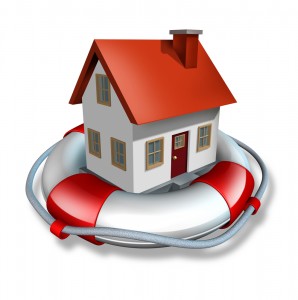March 13, 2012
 The need for home insurance is critical. The risk of losing one’s home or the myriad of valuable items inside it can be both mentally and financially catastrophic. However, at the very least the financial burden can be minimized by having proper home insurance. While you may feel the risk is minimal, an incident need only occur once to have serious consequences on the rest of your life.
The need for home insurance is critical. The risk of losing one’s home or the myriad of valuable items inside it can be both mentally and financially catastrophic. However, at the very least the financial burden can be minimized by having proper home insurance. While you may feel the risk is minimal, an incident need only occur once to have serious consequences on the rest of your life.
Nevertheless, paying a high monthly insurance premium may be its own headache when considering the multitude of expenses already attached to your home. Thankfully, there are plenty of ways to reduce the cost of home insurance, while still having the protection you need. The following are 5 such tips for saving money on your home insurance:
1. Increase Your Deductible
Naturally, the easiest way to reduce your insurance premium is to increase the amount you are liable for. If your environment is low risk, and the items you wish to ensure are expensive, it makes sense to have a high deductible. Most home insurance deductibles begin at $500. Raising that figure to $1000 or even $3000 could result in saving about 20 to 25 percent on your rate, based on recent statistics.
This will mean you will be responsible for slightly more of the cost should a disaster occur. However, raising your deductible is an excellent way to lower the cost of monthly premiums, while still providing the security of being protected from financial ruin. The difference between $500 and $3000 may seem large, but both are paltry sums compared to the cost of your home.
2. Buy Insurance Bundles
These days, many insurance companies offer products that cover multiple industries, such as homeowners, commercial, and automotive insurance. Purchasing your insurance through the same carrier can result in a hefty discount on both premiums. Although you will lose some flexibility in terms of being able to shop around, generally if you are satisfied with a company with regard to one service, you will have little trouble utilizing their other insurance products. Research which companies have the best home and auto insurance bundles before you commit.
3. Insure Only Your Home and Not the Land Beneath It
Often times homeowner’s do not realize that the most valuable part of their property is not the home, but the land it sits on. Moreover, they conflate the two when they apply for insurance, using the sale price of their property to calculate their premium.
This is a mistake, especially when you consider that the land will likely not be damaged in the event of a disaster. Only the cost of rebuilding the home should be factored when calculating your insurance premium, a number which is precipitously less than the sale price. Doing so should lower your premiums substantially as opposed to insuring the land and the house.
4. Discounts
There are an abundance of home insurance discounts that you may not be aware of, such as reductions for being a senior, not smoking in the home, or remaining a loyal customer. Asking your insurance agent about such packages could be useful in lowering your insurance.
5. Preventative Measures
Taking safety measures in the home will lower your overall risk, and lower risk to the insurer means better premiums. Some of the security and preventative measures you can take are adding additional smoke detectors, installing a high-end security system, installing storm shutters, deadbolt locks, and fire-retardant roofing.
Tags:
Business,
finance,
Home Insurance,
insurance,
money,
Money Saving
March 7, 2012
 Home insurance is a vital component of any home owner’s finances. However, many people still dismiss the benefits of such a policy, mainly due to the cost and the admin work involved when making a claim. As minor damages are usually dealt with and paid by the home owner independently to avoid the tedious process of making a claim, many assume that home insurance is unnecessary. However, this couldn’t be further away from the truth.
Home insurance is a vital component of any home owner’s finances. However, many people still dismiss the benefits of such a policy, mainly due to the cost and the admin work involved when making a claim. As minor damages are usually dealt with and paid by the home owner independently to avoid the tedious process of making a claim, many assume that home insurance is unnecessary. However, this couldn’t be further away from the truth.
Buying a property is already a huge investment. Couple that with the cost involved in maintaining it and you are faced with an incredibly expensive responsibility. Home insurance is designed to financially stabilise home owners and support them in the event of theft or damage. Finding a suitable and affordable home insurance quote is easier than you think. Due to the large number of providers, prices vary significantly from company to company.
Price comparison sites are particularly popular amongst insurance seekers across the country. Although these search engines are quick and easy to use, it is not advisable to accept a deal without visiting the insurance company directly first. Minor changes within the policy may occur which may mean that the cover is not specific or relevant for the home owner.
There are, however, other ways to ensure that you get a good deal:
1. Increase Security
Installing security and safety systems in and around the home will help bring premiums down. Insurance providers recognise the measures a property owner has taken to ensure they are both safe and protected. The ‘behaviours’ will be rewarded and thus monthly payments will be lowered.
2. Join Groups
Joining community groups can seriously boost the chances of receiving cheaper home insurance. Neighbourhood Watch programs are seen by insurers as a positive behavior that needs to be rewarded.
3. Review Contents
Expensive and sentimental belongings will all need to be covered by insurance to protect them against theft or damage. However, many people fail to inform insurers of changes in circumstance that can change the amount of monthly repayments. If a piece of jewellery, electronic device or appliance is no longer used or owned then providers need to be aware, otherwise they will continue to charge for those contents.
4. Increase the Deductible
The deductible in insurance is the amount of money that is needed to be paid before a claim can be made. The general theory is that the higher the deductible the lower the monthly payments. For those who decide to pay for minor repair work with their own earnings, this is ideal. In some cases, households can save up to $200 a year.
5. Combining Policies
Contacting an existing provider of insurance is a sure fire way of improving the likelihood of a discount. Most companies will reward existing customers with a substantial reduction on their policy if they combine two or more types of insurance with them. For this reason, existing providers should be the first port of call when gathering home insurance quotes.
This is a guest post by Nicola Winters on behalf of LV, a leading provider of home insurance.
Tags:
financial planning,
Home,
Home Insurance,
insurance,
Insurance policies,
Protection
December 4, 2011
 Before you can find the best life insurance quotes, you may need to reflect on what it is that you mean by best.
Before you can find the best life insurance quotes, you may need to reflect on what it is that you mean by best.
For example, are the best life insurance quotes those that are the cheapest or would you consider a policy which offered the highest lump sum pay out, to be the best?
Types of cover
While the basic principle of a lump sum payment to your family should you die remains the same, there are different types of life insurance policy available. There are also a number of ways that you may typically tailor the type you choose to match your own particular set of circumstances.
So, for example, you may opt for a policy that has:
• a lump sum payout, which decreases over time to tie in with a repayment type mortgage where the balance outstanding also decreases with each repayment you make – this is a decreasing term policy.
• a lump sum agreed at the outset of the policy and which doesn’t change over time – this is called a level term policy.
It may be worth noting that for either of these options, the monthly premium is likely to remain the same over the term of the policy.
You may also be able to combine this type of cover with critical illness insurance, which may provide a lump sum in the event that you are diagnosed with a life threatening illness.
Options
Once you have chosen the type of cover that you’d like, you may then need to choose:
• how long to you want the cover to last (the term of the policy) and this might correspond to the length of time your mortgage has to run or how long you have until you retire etc.
• the amount of cover you want (the size of the lump sum) – again, this may be tied into the amount of mortgage you have outstanding or an amount to provide your family with a bit extra once all the major bills were taken care of.
Premium prices will vary depending on the options that you select.
Tags:
best insurance,
financial planning,
Future finance planning,
insurance,
Insurance policies,
life insurance,
life insurance quotes,
personal finance,
protect your life,
save your life financially
 The need for home insurance is critical. The risk of losing one’s home or the myriad of valuable items inside it can be both mentally and financially catastrophic. However, at the very least the financial burden can be minimized by having proper home insurance. While you may feel the risk is minimal, an incident need only occur once to have serious consequences on the rest of your life.
The need for home insurance is critical. The risk of losing one’s home or the myriad of valuable items inside it can be both mentally and financially catastrophic. However, at the very least the financial burden can be minimized by having proper home insurance. While you may feel the risk is minimal, an incident need only occur once to have serious consequences on the rest of your life.


Recent Comments